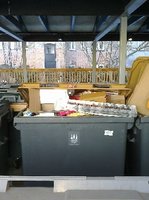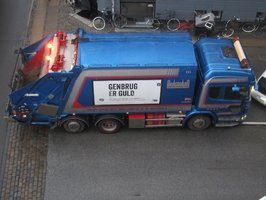

| Project lead ENVS : | Lars Kjerulf Petersen |
| Staff: | Student assistant Tilde Nikoline Bernth Kristiansen |
| Financed by : | DCE – Nationalt Center for Miljø og Energi, Aarhus Universitet |
| Budget : | 300.000kr |
| Duration: | 1/10 2012 – 31/12 2013 |
| Links : | Scientific report from DCE no 220 (in Danish) English summary of the report |
Aim and background
Does it make sense to ask private households to separate their waste in different fractions? That was the basic research question of this project, which investigated norms and practices of residents and the role of mediators such as caretakers or janitors who maintain apartment buildings. Source separation is important because household waste contains valuable resources, which can be recycled, thereby contributing to a more circular economy. Increased recycling does, however, require careful management of the entire waste stream including separation of waste in the households where it is generated. In order to have well-functioning waste separation it is necessary to understand the perceptions and practices of householders perceive.
The project focused on apartment buildings because apartments constitute 40 % of all accommodation in Denmark and 92 % of all accommodation in Copenhagen, and because there are special conditions for waste handling in that part of the housing stock.
Research design
The project’s empirical investigations were conducted in the fall of 2015 and consisted of the following.
Results
The analyses of the project’s empirical data indicate that residents in Copenhagen’s apartment buildings generally accept source separation of their household waste. If there is an option to separate a specific fraction and get rid of that fraction in an easy way most people will use that option most of the time. It even comes across as a general norm that people should separate their waste thereby contributing to the recycling of valuable resources and that people have a personal responsibility for correct waste separation. This general norm is in turn linked to three overlapping framings: (1) the principle that useful materials and things never should be wasted, (2) a general concern for the environmental, and (3) the need for nice and clean surroundings.
However, the extent and quality of people’s waste separation does not only rely on the prevalence of this norm but also on the infrastructural conditions for waste handling and on people’s knowledge and competences. Easy access appears to be an important factor. Well-functioning, accessible and understandable options for getting rid of the recyclable fractions seem to be a precondition for household participation in source separation. Similarly, knowledge and competences are crucial.
Other studies indicate that space – or lack of space – in the home is a critical factor; i.e. room for keeping the separated fractions in the home until they are carried to the collection point. But according to this study, space is not as critical a factor. It appears that if people want to separate their waste – as most do – they find solutions. Other studies also indicate that time as a critical, but this study contradicts such an assumption. Waste handling is integrated in daily routines for household and transport out of the home and time for waste handling is not perceived as a separate factor.
Problems in waste handling are usually handled by paid caretakers or by unpaid members of residents’ boards (in flat owner associations and cooperative housing associations). Some of them may go as far as to remove misplaced waste items and discard them correctly, but the main function of the intermediaries is to maintain the building’s waste handling infrastructure. They remove items that block garbage chutes, garbage sheds and all other parts of the infrastructure. They tidy up basements and courtyards when residents have made a mess. And they communicate current and new rules through notices, mail messages, Facebook postings, personal advice, and sometimes through direct communication to wrongdoers. In this way, they keep the waste stream flowing thereby also contributing to the efficacy of source separation.